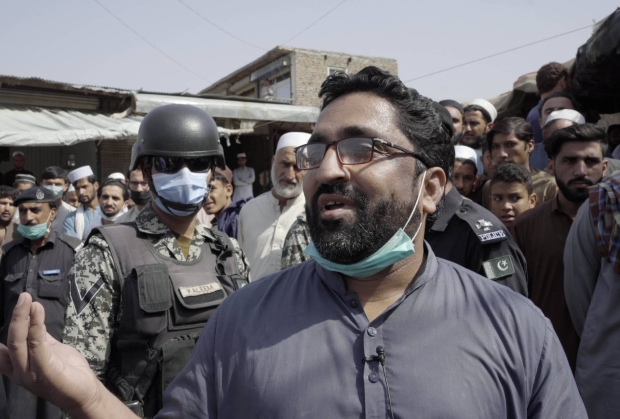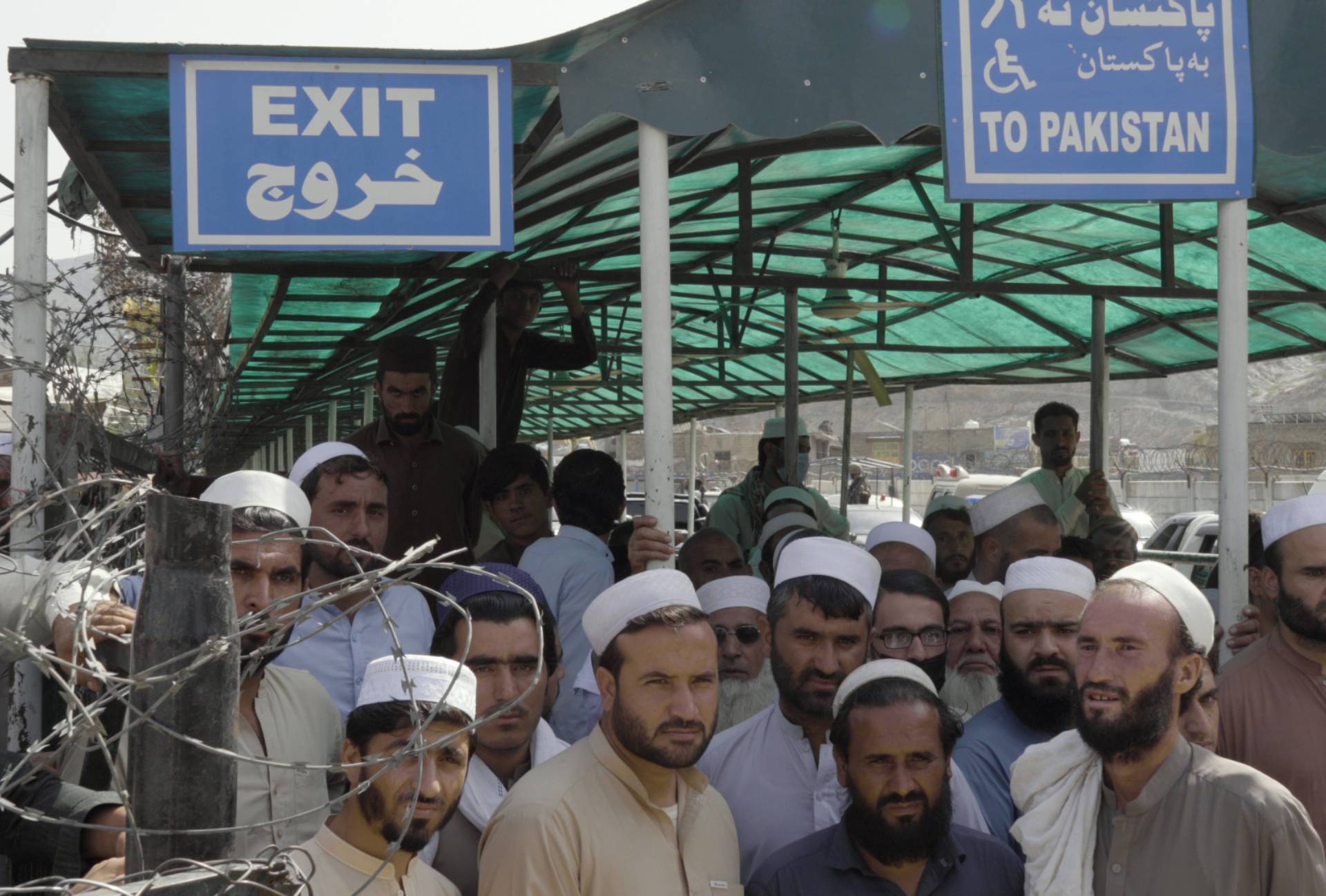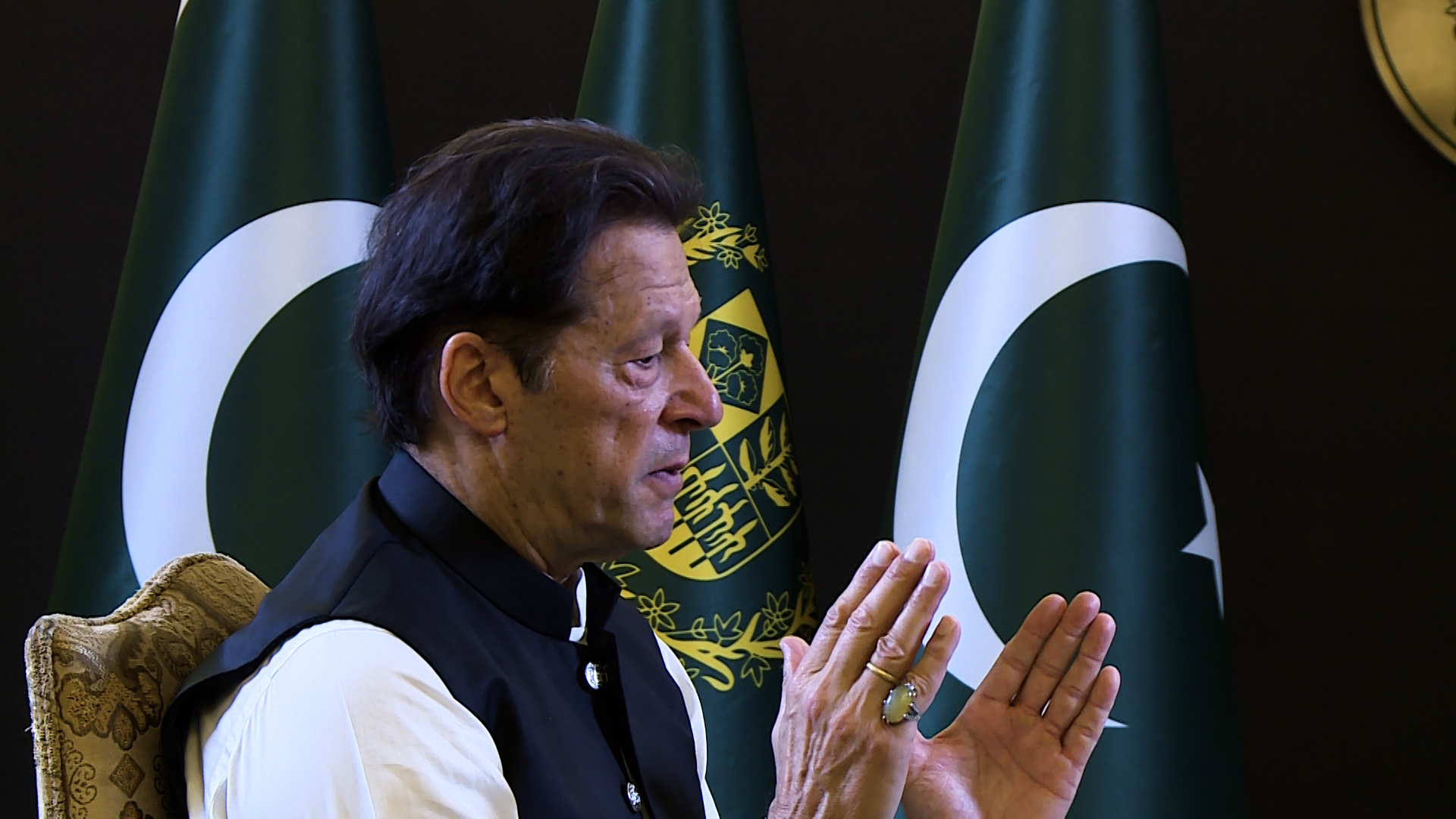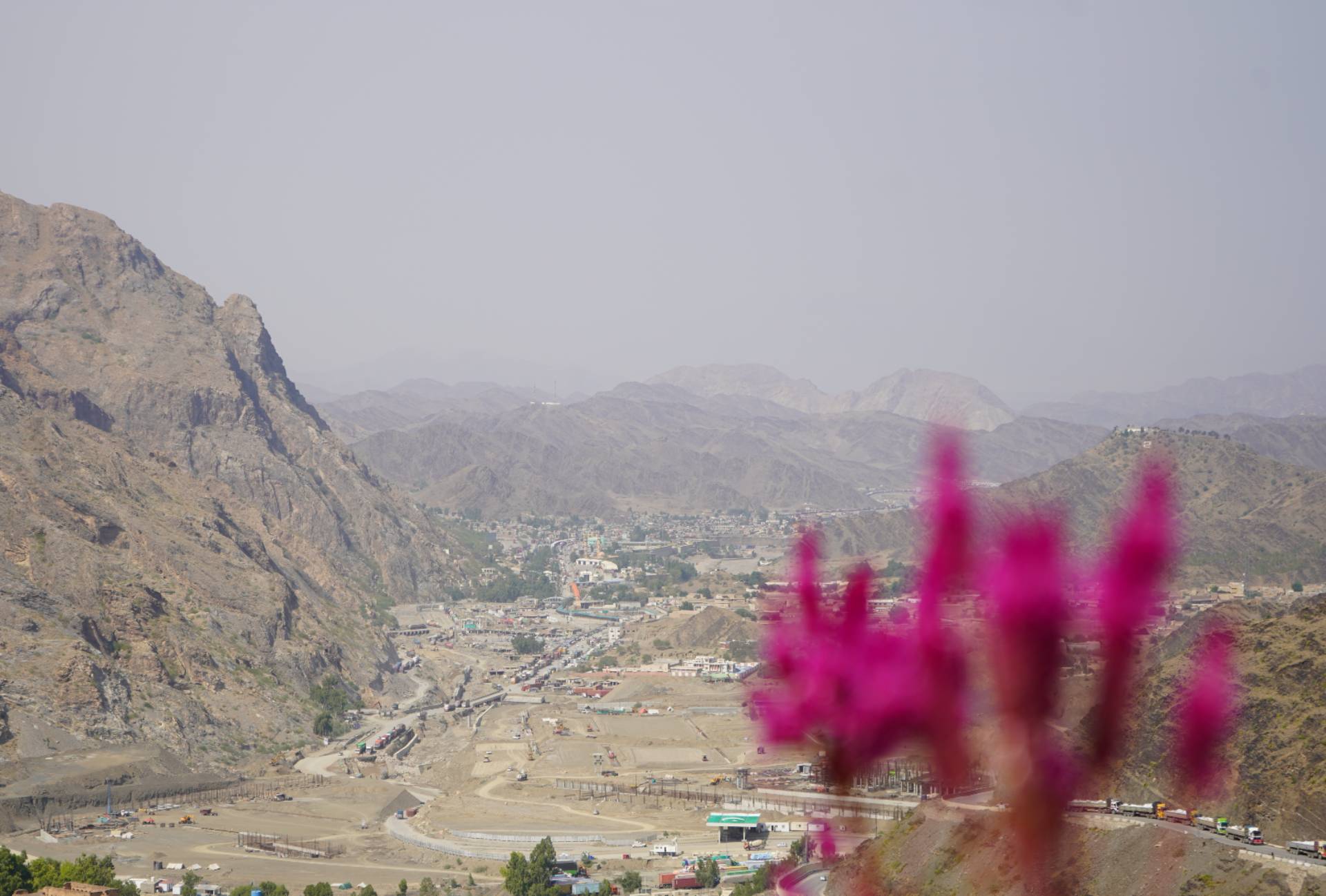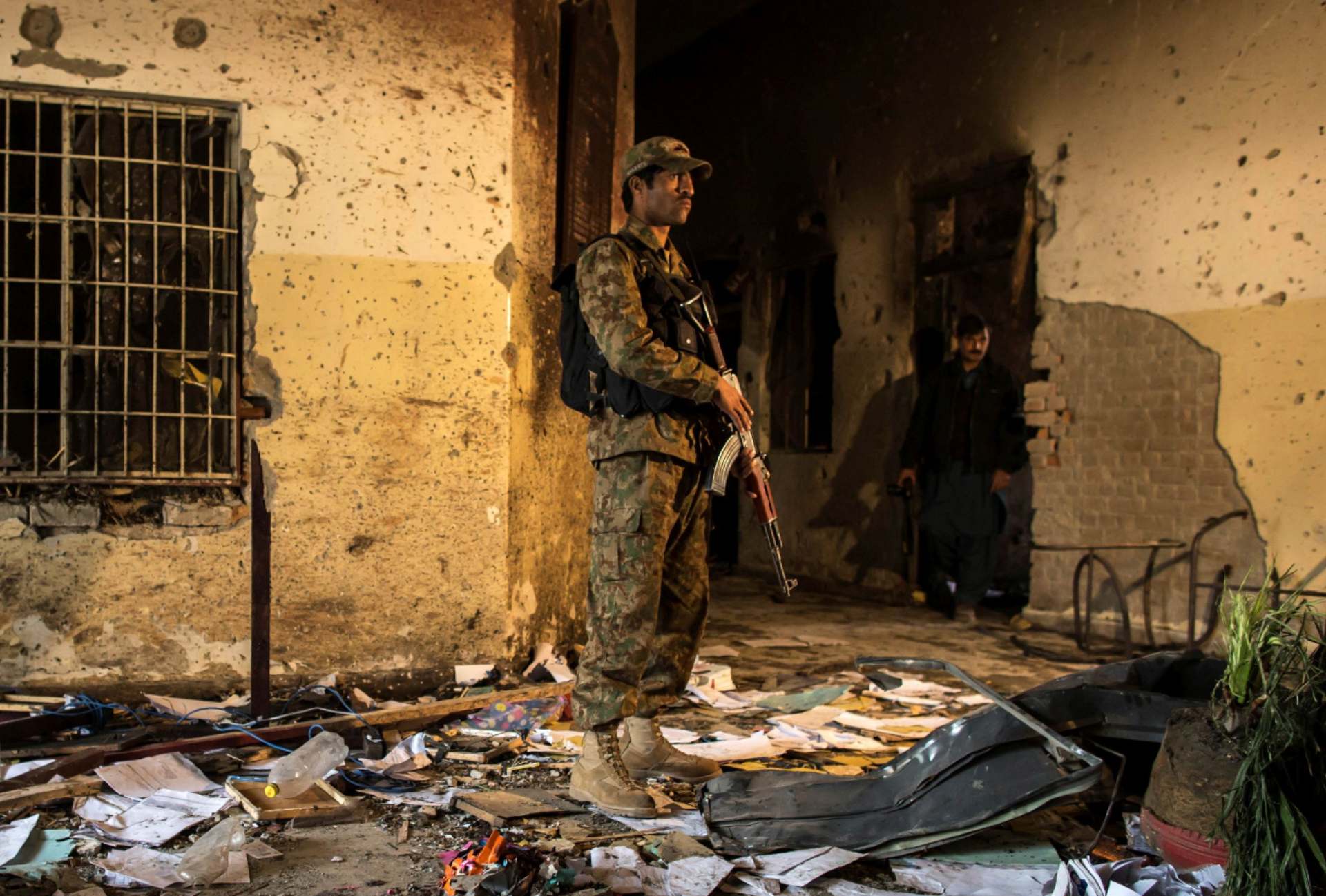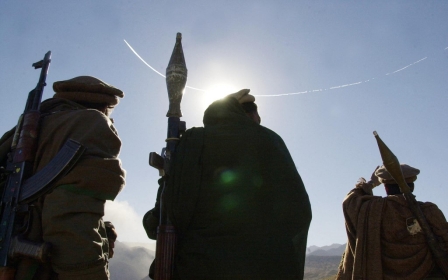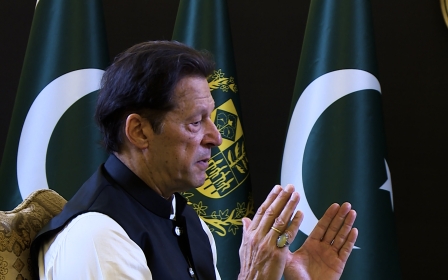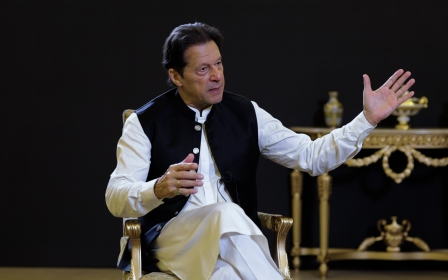Waiting for peace in the Khyber Pass: Why Pakistan fears instability in Afghanistan
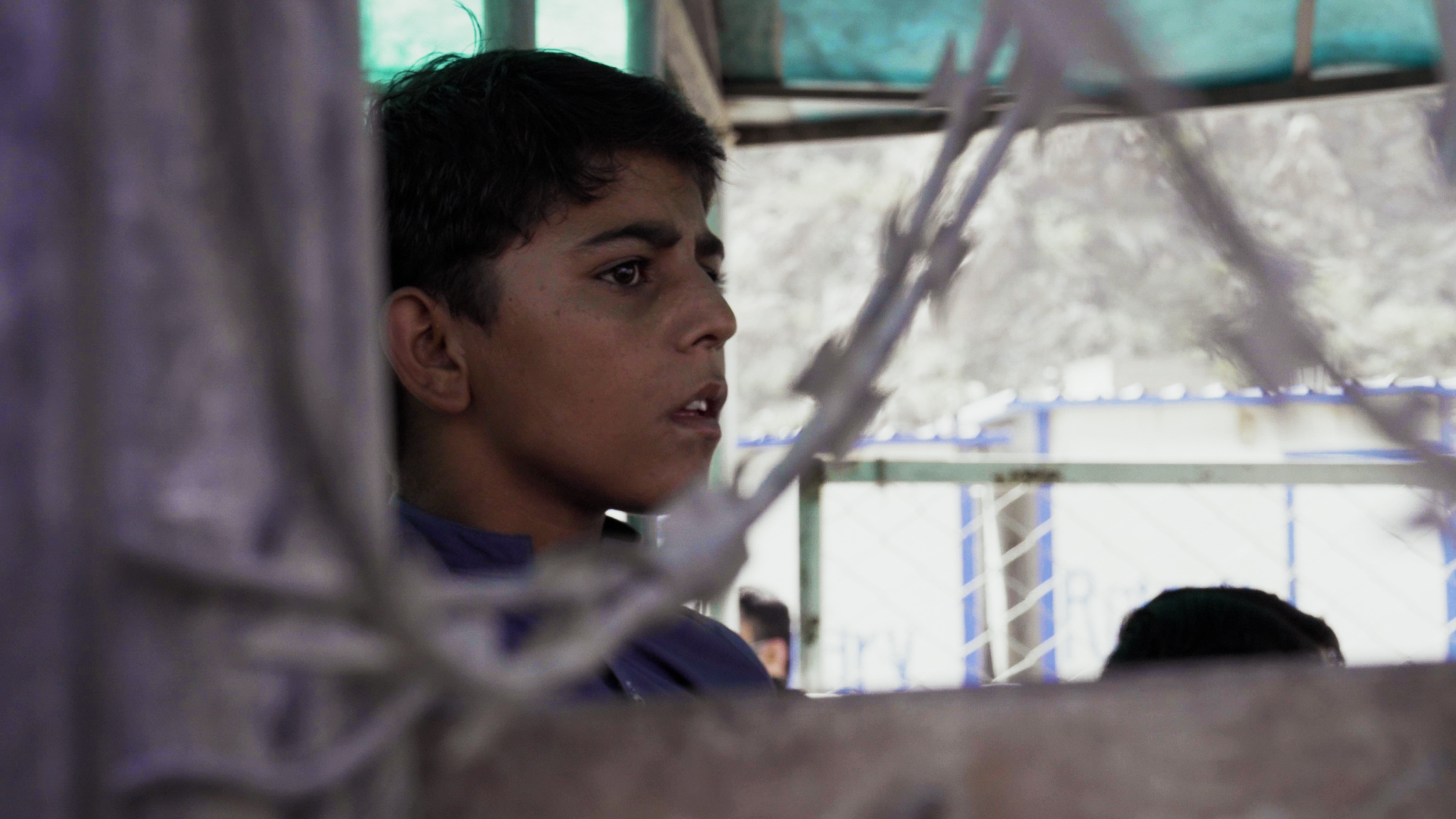
A silent crowd 200 strong presses up against the metal barriers at Pakistan’s border with Afghanistan at Torkham.
They gather each morning at dawn. Some have been waiting for days for the crossing to open. Approach them and you are instantly surrounded by people bursting to speak but who can only remain intensely silent.
“How many people here are Afghan?” we ask. No one comes forward. Security officers push them back into a metal pen. An army colonel intervenes and two are allowed to come forward.
The stories of private desperation are endless: couples who are separated, labourers who cannot get to work, Afghans who went to Peshawar for medical treatment and now cannot get back, burka-clad women with the wrong documents stuck at the border with crying babies, and children hiding between the wheels of trailers to smuggle food across the border. If they manage to cling on, the going rate is $6 a day.
'Pashtuns are living on both sides and we have the same wishes for peace'
- Sayyed Mannan, from Sindh
When the border is closed, as it was when we were there, the whole economy of the Khyber Pass closes down. Shops are shuttered. Roads are without traffic.
New MEE newsletter: Jerusalem Dispatch
Sign up to get the latest insights and analysis on Israel-Palestine, alongside Turkey Unpacked and other MEE newsletters
When it is open, a tide of people descends on Torkham.
"My wife, she's Pakistani, she went there [Afghanistan] two or three months ago for a marriage ceremony. Now I'm waiting for her here,” said Sayyed Mannan from Sindh.
"They are checking the documents. They [the authorities] are all supporting us. But it's taking some time.”
Mannan says this carefully so it can be heard by military ears: "We wish for peace for both countries. Pashtuns are living on both sides [of the border] and we have the same wishes for peace.”
We were told the border had been closed because of Covid. But Islamic State militants had just bombed a Shia mosque in Afghanistan’s Kandahar region killing 47 people. Tension was high and troops from the Khyber Rifles were everywhere. We were driven to the border crossing in an armed convoy, accompanied by an ambulance.
We flashed past a silent demonstration of stranded workers carrying black flags at the side of the only road to and from the border. They were all alone and appeared to be appealing to the rocks of a sheer cliff face.
Our colleague, the Peshawar-based journalist and author Irfan Ashraf, approaches a group of workers. “Don’t defame Pakistan,” said an armed official to one worker. “I was surrounded by people, but nobody dared talk.” Irfan later wrote.
The source of this tension is a fence 823 kilometres long. It is patrolled day and night. It is bolstered by 443 forts and 143 bunkers and towers in Khyber Pakhtunkhwa [also known as the former North-West Frontier Province] alone.
In this part of the border a battalion of 700 soldiers has been deployed to patrol a section of just 15 kilometres.
Scanned by thermal imagers, night vision cameras and drones, the multilingual notice pinned on the wire fence is all but redundant: “Do not come near the fence. You will be shot.”
Emperor Hadrian, who built a wall to stop Scottish clans invading Roman Britain and protect Pax Romana, would have been envious.
Imran Khan, then and now
The bitter irony of today's Pax Pakistan in the former tribal areas is that the man sitting in the emperor’s palace in Islamabad, the man who is the military’s friend, rose to prominence as a human rights campaigner excoriating what was happening there.
Imran Khan, now Pakistan’s prime minister, was all but alone in the political establishment in standing up for the rights and wellbeing of the tribes whose land was ravaged by deadly violence in one of the lesser reported conflicts wrapped up in the so-called 'war on terror'.
The once proudly self-governing Federally Administered Tribal Areas (FATA) no longer exist, having been brought under the rule of the state. The Tehrik-e-Taliban Pakistan (TTP), often called the Pakistan Taliban, has been largely cleared out after over a decade of brutal civil war.
Earlier this week Khan’s government confirmed details of a month-long ceasefire agreed in controversial peace talks with remnants of the TTP in Khost province in southwestern Afghanistan which Pakistan’s information minister, Fawad Chaudhry, said had been facilitated by the Afghan Taliban.
Then and now are two different versions of Imran Khan. Call them Khan 1.0 and Khan 2.0.
Long before he rose to power as prime minister, Khan 1.0 wrote an impassioned history, part autobiographical, part political history, entitled simply “Pakistan”.
This was in the days of military coups and autocracy, of General Pervez Musharraf putting democracy in a deep freeze and turning his weak nation into the Pentagon’s forward supply base and drone launcher.
When the Americans accuse Pakistan of helping insurgents fight allied forces in Afghanistan, Khan 1.0 writes in 2011, they fail to understand the Pashtun mentality. This is one year after a major army onslaught against the Pashtun-dominated TTP in South Waziristan.
'Anyone with even a basic knowledge of the history of the region knows that for reasons of religious, cultural and social affinity, the Pashtuns feel a deep-rooted duty to help their brethren on either side of the Durand Line'
- Imran Khan, 2011
“Many Pakistanis - in the army, the government and the general public - were against the invasion of Afghanistan from the start. But for the Pashtun, their loyalty is clear cut. Anyone with even a basic knowledge of the history of the region knows that for reasons of religious, cultural and social affinity, the Pashtuns feel a deep-rooted duty to help their brethren on either side of the Durand Line. For them the international frontier is irrelevant.”
The Durand Line refers to the 1893 frontier drawn by Henry Mortimer Durand, a 29-year-old civil servant who accompanied British soldiers into Kabul in 1879 in what became known as the Second Anglo-Afghan War, separating Afghanistan from British-ruled India. It remains the border between Afghanistan and Pakistan to this day.
No one in the Pakistani army calls it the Durand Line. They say their border is set by the Survey of Pakistan, the government mapping agency, not by a Briton in the 19th century. “There are some deviations,” a military briefer insisted. But it is essentially the same line.
Khan 1.0 continues: “So no government, Pakistani or foreign, will ever be entirely successful in stopping them crossing over a 1,500-mile border to support their people or feeling obliged to offer them shelter if they venture into their territory.”
This is more or less what Khan 2.0 is doing now. The border fence that Musharraf called for, and former prime minister Nawaz Sharif began, is being completed under the premiership of the man who excoriated them both in opposition.
'Law and order problem'
Khan’s advisors are pragmatists. “The army knows how to deal with the TTP. It's a law and order problem. It will deal with them in that way,” one said.
To borrow a well-known phrase from The Troubles in Northern Ireland, whose law and whose order?
“The local population understand it's for their peace and security. There is a socio-economic divide. Those who live on this side prefer to stay on this side. They are business-minded people,” a military source said when pressed on this.
But it's less clear-cut than this.
'The only thing we can talk about [to the TTP] is to accept as citizens those who surrender their arms. So the talks will get nowhere'
- Islamabad source
“We cannot give them Sharia [a longstanding TTP demand] because the KP [Khyber Pakhtunkhwa] is now part of the Pakistan state. The only thing we can talk about [to the TTP] is to accept as citizens those who surrender their arms. So the talks will get nowhere,” said one informed source in Islamabad, referring to the negotiations underway in Afghanistan.
“There have been a few incidents. They cannot get through the fence but what is to stop their supporters coming through with legitimate papers, ID and passport?” he said.
One of the “incidents” he was referring to was a suicide bomber ramming a military convoy with a motorcycle loaded with explosives at a checkpoint near Quetta in September. Four were killed and 20 injured.
Many remain doubtful about the longer-term prospects of the ceasefire with the TTP, with military sources last week telling Dawn newspaper that they remained “cautious”.
Factions within the TTP also appear divided. Earlier this month, prior to the confirmation of the ceasefire deal, a tape was released of a senior commander of one faction within the TTP, Saddar Hayat of the Hafiz Gul Bahadur group, directing his deputies to suspend military operations against government forces in North Waziristan for 20 days.
The temporary ceasefire was immediately rejected and denounced by another TTP faction, the Hakimullah Mehsud group.
The disagreement prompted Muhammad Khurasani, who claims to speak for the TTP, to deny the TTP had any "groupings" or that it had "announced any ceasefire anywhere”.
But there has been pushback against the talks within Pakistani political circles as well. Khan usually prefers to talk about peace talks in terms of “surrender” on the part of the TTP. He is obliged to use this language because the domestic repercussions are highly sensitive.
The two main opposition parties, the Pakistan Muslim League Nawaz (PML-N) and the Pakistan Peoples Party (PPP), have said negotiations are tantamount to sprinkling salt on the victims of the TTP.
They say TTP atrocities like the attack on the army public school in Peshawar in 2014, in which more than 150 people including 132 children were killed, or the murder of former prime minister Benazir Bhutto cannot be erased that easily.
Sherry Rehman, a senior PPP leader, said on Twitter: "Again the PM wants to give amnesty to the TTP. Has he asked parliament what we think about that? And has he heard the TTP response?"
"How can the government give amnesty to TTP? They are responsible for deaths of APS [army public school] children, thousands of our troops, and [former premier] Benazir Bhutto,” Rehman said.
'Toxic fiction'
Veteran watchers of the conflict like Irfan Ashraf dispute Khan’s narrative equating sympathy for the Taliban with Pashtun nationalism, which he gave in his speech to the UN General Assembly in September and his recent interview with Middle East Eye.
Khan said on both occasions that Pashtuns on Pakistan’s side of the border with Afghanistan began attacking the state when it allied itself with the United States that had invaded Afghanistan.
“Clubbing together the Taliban and Pakhtun [Pashtun] nationalism is toxic fiction with real consequences. The Taliban derive their identity from a jihadi culture sponsored by the US and nurtured by the Pakistani state in the shadow of Cold War politics,” Ashraf wrote in Dawn last month.
“Eighty thousand jihadists, including Arabs, were trained in the Pakhtun belt before being launched to fight the Soviets in Afghanistan. The Taliban - who were groomed in the madrassa culture on the Pak-Afghan border with the homeless Arabs later called al-Qaeda - might speak Pashto but take pride in Arab culture.
“They don’t believe in a national land, a national flag or local history. They killed thousands of Pakhtuns. Yet, Khan wants to prove they are nationalists.”
'If they are starved of funds and Afghanistan descends into chaos, there is only one way for the breakaway groups of Taliban to go, and that is towards the hardline groups'
- Islamabad source
The cause of Pashtun nationalism, according to Ashraf, is crushed between the army and the TTP, who trade messages to the other in civilian casualties.
One thing everyone agrees on: the vulnerability of Pakistan to events in Afghanistan is clear. The ceasefire with the TTP is also contingent on the Taliban in Kabul maintaining control of the country.
The international financial boycott of the Taliban in Kabul spells disaster to anyone sitting in Peshawar or Islamabad.
“If they are starved of funds and Afghanistan descends into chaos, there is only one way for the breakaway groups of Taliban to go, and that is towards the hardline groups,” a well informed source said in Islamabad.
“The only option left is to incentivise the moderates by allowing funds in. The way to ensure extremism is to starve them.”
Another source put it like this: “You have 200 people assembled outside your mosque and you have two options: you can either give them food or ideology. The more food you give them, the less ideology the Taliban will need.”
“They are not the same as the Taliban of 2000. They are the second generation. They are also not only Pashtun. They have Uzbek and Tajik commanders. They have never defined themselves as Pashtun.”
Suspicion of US intentions towards Afghanistan remains high, with MEE’s source in Islamabad framing the situation there in terms of sharpening tensions between Washington and Beijing.
“China will take over from them militarily in 2040. So the US has got 10 years to stop them. If the US decided to let the money through, it means they would be supporting the very axis, of China, Pakistan and Russia, that they are determined to stop… So do they really want to stabilise Afghanistan?” said the source.
Twenty years ago, the defeat of the Taliban unleashed an insurgency in Afghanistan that condemned Pakistan to years of civil conflict. The return of the Taliban to Kabul brings different problems. Pakistan desperately wants peace and stability in its troubled neighbour. Others may have different ideas.
Middle East Eye delivers independent and unrivalled coverage and analysis of the Middle East, North Africa and beyond. To learn more about republishing this content and the associated fees, please fill out this form. More about MEE can be found here.


